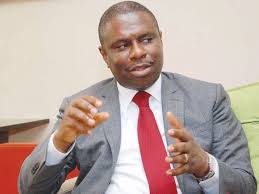The Nigerian Maritime Administration and Safety Agency (NIMASA) has increased its annual revenue contribution to the Federation Account to N20 billion following recent transformational strategies adopted by the management.
Specifically, the improved revenue remittance by the agency to the federation Account up from the N3 billion yearly remittances in the past to the current value is attributed to the adoption of measures to block financial leakages.
A statement issued by agency’s Head, Corporate Communications, Isichei Osamgbi, quoted the Director-General, Dr. Dakuku Peterside, as saying that the adoption of globally certified tools to plug loopholes in the financial system has made it practically difficult for any operator to abuse the fiscal guidelines on levies and fees payable.
Peterside clarified: “In order to block financial leakages, we subscribed to a full bouquet of the Lloyds and Clarkson intelligence; this made it almost impossible for any vessel calling at our ports to escape or under declare; the TSA and our collaboration with the Nigeria Customs Service among other agencies also played an important role.
“NIMASA has transformed from contributing barely N3bn to over N20bn annually to the CRF and it will keep getting better”, the NIMASA boss added.
Peterside also reiterated the agency’s commitment to growing indigenous capacity in the sector, pointing out that the collaboration between NIMASA and the Central Bank of Nigeria (CBN) is designed to ensure that vessel investors and other sectoral operators could access bank credit at special interest rates.
In addition, he explained that the partnership would also help in making operators secure intervention funds for vessel acquisition and other ancillary transactions in the sector, for the purposes of improving the nation’s Cabotage regime and properly positioning the maritime sector on the path of sustainable growth.
The NIMASA boss pointed out that the Association of African Maritime Administration where he currently serves as the chairman had prioritised enabling Africa and improving its contributions to and share in the global maritime trade business.
He explained: “Some African countries still operate along colonial inclination and that tends to slow down development particularly in the maritime sector. In those countries where democracy is fully thriving such as Nigeria, stakeholders in the maritime sector now speak with the voice of development, independent of colonial masters.
AAMA, under my watch has been able to give African maritime sector a new voice, particularly at the International Maritime Organization”, Peterside assured.






